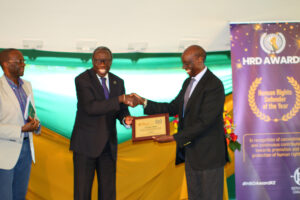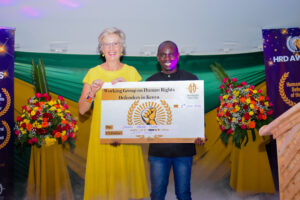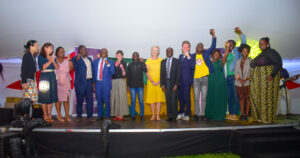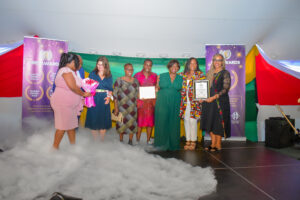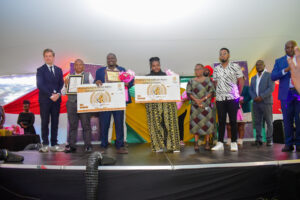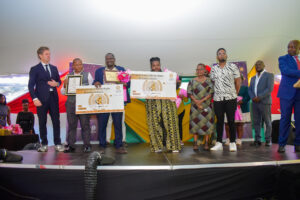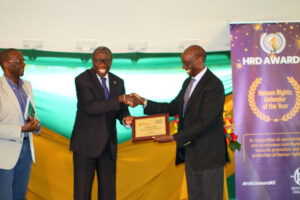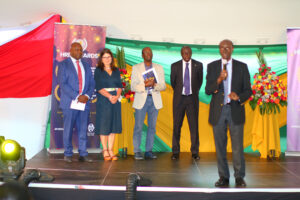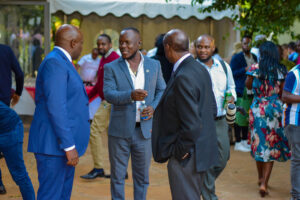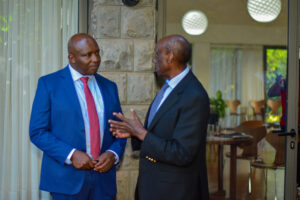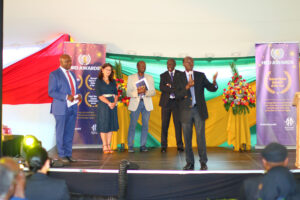Kickstarting my Journey to summit Point Uhuru on Mt Kilimanjaro in october 2024
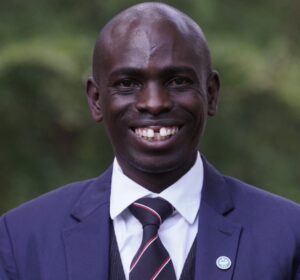 What would Dennis Orengo’s grand debut in hiking be in his village? Well, he’s aiming to shake things up and make his folks burst with pride this October by conquering Mt. Kilimanjaro as part of the Climb for Justice Campaign! After all, he’s already shown off his hiking skills in Kakamega Forest, and he’s dead set on joining every preparatory hike
What would Dennis Orengo’s grand debut in hiking be in his village? Well, he’s aiming to shake things up and make his folks burst with pride this October by conquering Mt. Kilimanjaro as part of the Climb for Justice Campaign! After all, he’s already shown off his hiking skills in Kakamega Forest, and he’s dead set on joining every preparatory hike
leading up to the final climb for justice destination this year Dennis – is a Human Rights Defender, fighting for the marginilazed and vulnerable groups like widows, children, refugees, Persons with Disabilities (PWDs), and even those unfortunate victims of extra-judicial
Let’s kick off with a fun question. If you were a mountain, which one would you be and why?
Well, if I were a mountain, I’d definitely be Mt. Kilimanjaro.It’s the African heritage and the uniting factor of Africa, aside from being the highest peak in Africa. Plus, during a recent trip to South Africa, I caught a glimpse of Kilimanjaro’s peak from the plane. But here’s the kicker: it was missing its iconic snow cap! Yet, just days later, my
buddy spotted it, complete with a fresh blanket of snow. Talk about resilience and global presence, right? Kilimanjaro’s enduring nature, with those ice caps standing tall, truly strikes a chord with me.
Impressive choice! Tell us about your first Climb for Justice hike experience.
Ah, 2020 in Kudu Hills – quite the experience! I’ll admit, I underestimated the terrain and paid for it. I finished the hike 3 hours later after everyone was done. But it taught me the importance of preparation and perseverance. This year, I plan to tackle every hike with gusto and summit Mt. Kilimanjaro!
At least be the first one in my village to get to that level(laughs)
What’s one thing you’re looking forward to the most on Mt. Kilimanjaro?
The challenge, definitely. It’s about being part of a group that believes in a risky yet noble cause. And the comradeship that comes with it is priceless.
Speaking of noble causes, why do you believe in the #BuyHakiBuild-Haki Campaign?
It’s simple – without the Defenders Coalition, our work as HRDs would be much harder. They’ve been a pillar of support, making advocacy more easier and accessible through their protection and safety mechanisms to
Human Rights Defenders. Joining this cause was my resolution for the year, and I’ve gained so much in the last 7 years from their wellness programs and training over the past seven years,then why not support raising funds for a home that will help more other people.
Now, let’s delve into your preparations for climbing Kilimanjaro.What’s your routine like?
Oh, it’s quite the regimen! I’m a sporty person . I start my day with a morning run to get the blood pumping, followed by daily vigorous exercises. Psyching up my mind is crucial, so I read about others’ experiences and also information about Kilimanjaro. And of course, a balanced diet is key.
Plus,to be the first from my village to summit adds a bit of extra motivation!(chuckles)
That’s dedication! How will you rally others to join you for the Climb for Justice cause?
Every month, I’ve committed that I’ll contribute to the cause with a small amount of ksh 100 or ksh 200, hoping it’ll add up to benefit Haki village, a project close to my heart. It’s the least I can do, given the incredible support we’ve received from the Defenders Coalition over the years. And I encourage others to pitch in, even if it means sacrificing a lunch or two!
Parting Shot
Let’s get one thing straight – Haki Village ain’t just some project for the Defenders Coalition to claim; it’s for all you Human Rights Defenders out there. So, fellow champions of justice, let’s roll up our sleeves and dig deep. This isn’t just a win for us today, but a legacy we’re leaving for the HRDs of tomorrow. Spread the word, grab some merchandise, and let’s march forward together because Haki Village isn’t just a place; it’s a unifying force that binds us all! See you in Kilimanjaro!Shall we?
Support Dennis Orengo by donating any amount via
Mpesa Paybill 810896
Accunt: ORENGO
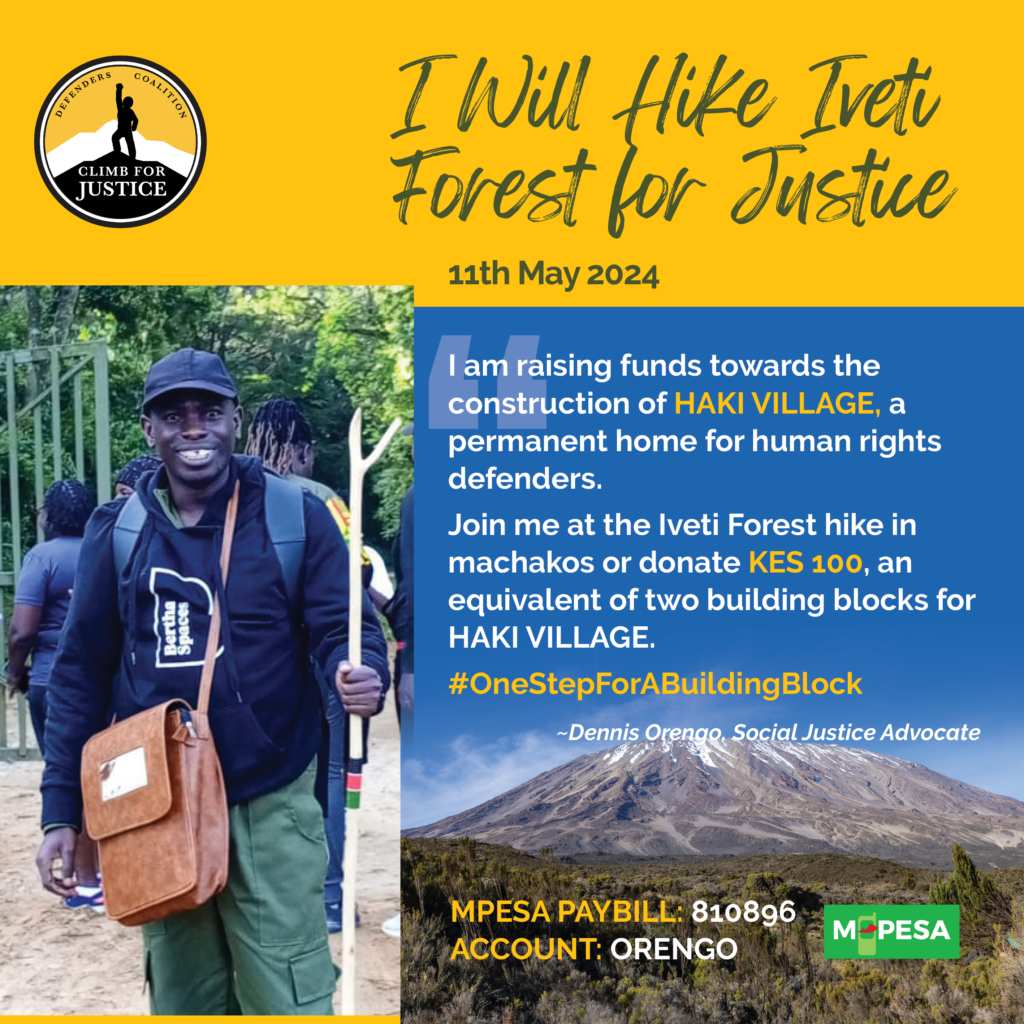
ALARM OVER THE MURDER OF RURAL PASTORALIST WOMEN IN KARGI, MARSABIT COUNTY
Thursday, 22 February 2024, Nairobi Kenya
The Defenders Coalition, Samburu Women Trust (SWT) and the Pastoralists People’s Initiative (PPI) condemns a series of attacks of pastoralist women leading to the death and serious injuries. The latest victim, of Margaret Aleya Eisimonte, a resident of Rongumo Clan in Kargi area, Marsabit County
Margaret Aleya Eisimonte tragically died on 18 February 2024 following a serious beating allegedly by a group of Morans as instructed by elders from the Rendille Community.
It is alleged that a traditional medicine man (Mganga) was invited to the Rongumo clan to identify witches in the Manyatta, who in turn gave a list of women accusing them of the diabolic practices happening.
The pronouncement by the mganga, led to the brutal assault against Margaret Aleiya Esimonte by the Morans. Members of a nearby clan who learnt about the incident are then said to have responded by rushing Aleiya Esimonte to a local hospital where she succumbed. She was buried on 20th February in Kargi Public Cemetery.
A second victim of the barbaric attack, Ms Wareheya Sahado, is said to be recuperating after receiving a barbaric beating targeting her private parts by the same morans. Although discharged from the hospital, she has to make several trips to the hospital for specialized care.
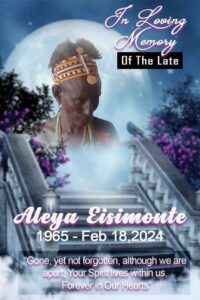
Margaret Super, a woman human rights defender from Marsabit, has expressed the fear that more women are likely to be attacked and killed.
“We are shocked by this occurrence. This is murder and the murderers are walking free, and this is unacceptable. We do not know the number of women on that list by the Mganga and we fear that more women will be targeted for assault and murder just like Aleya.”
Margaret said that this is a strange incident that calls for the attention of all relevant agencies in Marsabit to bring the perpetrators to book.
Jane Meriwas, the Executive Director, Samburu Women Trust has described the incident as one of the many that remains unreported and the perpetrators walk scot free.
“We are concerned that this is a purely femicide issue because it is only women that are accused and targeted for alleged witchcraft. We are worried that if not stopped, the moran will come for the woman who survived the attack or even go for other women! We are not safe here!’ expressed Meriwas.
Kamau Ngugi in concerned killing of women is on the rise in Kenya and the authorities appear uncorned. Over 20 cases of femicide were recorded in 2024.
“This unfortunate incident highlights the pervasive nature of violence against women. The death of Aleya is an example of the price that women in poor rural settings pay for just being women. It must be condemned.”
Defenders Coalition calls on all agencies to heed the call by the Government Advisor on Gender issue Ms Chiggai to fight the creeping culture of killing women.
The Defenders Coalition strongly condemns these acts of untold violence against poor rural women in Marsabit and calls on:
Signed
Kamau Ngugi – Executive Director, Defenders Coalition.
Jane Meriwas – Executive Director, Samburu Women Trust (SWT)
Margaret Super – Founder Pastoralists People’s Initiative (PPI)
Name of Organization: National Coalition of Human Rights Defenders – Kenya
Observer Status Number:
Situation of Human Rights Defenders in Kenya
Submitted by: Kamau Ngugi– Executive Director
76th Ordinary Session of the Africa Commission on Human and Peoples’ Rights
Arusha, Tanzania
Public Session
Human Rights Situation in Africa
October 2023
Mr. Chair, distinguished commissioners and state delegates representatives of NHRIs and NGOs.
On behalf of the National Coalition of Human Rights Defenders -Kenya (Defenders Coalition), I would like to thank the Commission for this opportunity to raise some of the key human rights concerns from Kenya. Human Rights Defenderss play a critical role in any given community as they contribute to the protection and promotion as well as the realization of fundamental rights and freedoms. In 1998, the United Nations General Assembly (UNGA) adopted the UN Declaration on HRDs that recognizes the right and responsibility of individuals, groups and organs of society to promote and protect universally recognized human rights and fundamental freedoms[1]. Further, the Declaration bestows the responsibility of implementation of provisions of the Declaration, with specific reference to Articles 2, 9, 12, 14 and 15.
Regionally, Resolutions ACHPR /Res.69(XXXV)04[2] and ACHPR/Res.196 (L) 11[3] recognises the critical role of HRDs in democracies and the difficult environment in which HRDs in Africa operate and Resolution ACHPR/Res.245 (LIV) 13[4] on the challenges that women defenders continue to face on the African continent regarding the recognition, exercise and enjoyment of their rights. These resolutions call for states to put in place protection of human rights defenders in Africa.
Despite the existence of this legal frameworks in support of HRDs in Africa which includes Kenya, Defenders Coalition is concerned that the legitimate role of protection and promotion of human rights carried on by human rights defenders and Civil Society Organizations is habitually criminalized and remain target for reprisal by both state and non-state actors. Particularly attacks against women human rights defenders, sexual minority activists, environmentalists and those working on business and human rights issues have escalated. Accountability for these violations remain unaddressed as mandated oversight institutions are unable, for various reasons, to investigate, prosecute and serve justice to the victims and survivors.
Below are documented incidences of violations of human rights and fundamental freedoms of human rights defenders in Kenya:
The prevailing hostile operating environment in Kenya led to the murder of three HRDs. In April 2023, an activist was killed by bandits for confronting them about their continuous banditry attacks on neighbouring communities[5]. An activist litigating on behalf of victims of rape and coercion to sex for work after an expose by BBC Africa in one of Kenya’s multinational tea estates was found dead in his home[6]. A sexual minority activist, Edwin Chiloba was brutally murdered, and his body dumped in a metal box by the roadside[7].
Concerning incidents of crackdowns and criminalization of civil society of HRDs is on the rise. Sinece January 2023, three (3) activists have been killed[8]. Seven (7) HRDs have been either arrested, detained or are facing trumped up criminal charges in courts of law. Sexual minority and WHRDs continue to face untold violence. There killing of WHRDs Joannah Stutchbury, Elizabeth Ekaru and Sheila Lumumba remain unresolved despite intensified advocacy efforts.[9] The only known arrest following the killing of Elizabeth Ekaru.
According to the 2023 Press Freedom Index by Reporters Without Borders, Kenya ranks position 116 out of 180, a significant drop from the position 69 recorded in 2022[10]. The situation is worsening in what appears as a campaign to cripple independent media and individual journalists through a combination of commercial, verbal, and physical attacks[11]. Targeted are media and journalists perceived to be real or imagined critics of the new administration with reports that independent media houses are under pressure to fire certain journalists and employees.The violation on media professionals including journalists was on the rise during the period with verbal and physical attacks being documented. The Media Council of Kenya (MCK) documented 45 incidences of profiling of and threats to individual journalists and media outlets by politicians related to 2022 General Election in Kenya. By March 2023, the MCK least 25 reporters were attacked by both members of the public and the state.[12]
In 2023, the Defenders Coalition has documented 61 cases of illegal restrictions and criminalization of human rights defenders exercising their freedom of Assembly[13] and arrested and unlawfully detained hundreds of citizens for taking part in anti-government protests. To this end, we are concerned that there is an onslaught on the freedom of assembly, specifically by state security agencies by use limiting legislative laws such as the Public Order Management Act, 2012[14] and Penal Code. Human rights defenders (HRDs) and other peaceful protesters are arbitrarily arrested by the police, unlawfully detained for long periods and charged with trumped up criminal charges besides brutalization and murder by security agencies[15]. Journalists have also been victims of this onslaught. Among the most affected counties are Kisumu, Migori, Nairobi, Makueni, Kajiado, Nakuru and Mombasa.
In light of these updates and observations, we urge the African Commission on Human and Peoples’ Rights to:
[1] https://documents-dds-ny.un.org/doc/UNDOC/GEN/N99/770/89/PDF/N9977089.pdf?OpenElement
[2] http://hrlibrary.umn.edu/africa/resolutions/rec74.html
[3] https://achpr.au.int/index.php/en/adopted-resolutions/196-resolution-human-rights-defenders-africa-achprres196l2011
[4] https://achpr.au.int/en/adopted-resolutions/558-resolution-need-study-situation-human-rights-defenders
[5] https://nation.africa/kenya/counties/baringo/bandits-target-baringo-activists-in-killing-spree-4200638
[6] https://nation.africa/kenya/news/activist-in-tea-firms-sexual-abuse-case-found-dead-at-home-4172544
[7] https://www.bbc.com/news/world-africa-64229077
[8] https://nation.africa/kenya/counties/baringo/bandits-target-baringo-activists-in-killing-spree-4200638
[9] https://srdefenders.org/kenya-concerns-killing-of-environmental-defender-joannah-stutchbury/
[11] https://defenderscoalition.org/media-freedom-under-siege-in-kenya/
[12] https://reutersinstitute.politics.ox.ac.uk/news/journalists-punched-kicked-and-tear-gassed-inside-darkest-month-kenyan-media
[13] https://defenderscoalition.org/defenders-coalition-welcomes-decision-by-the-director-of-public-prosecutions-not-to-prefer-charges-against-74-sabasaba-peaceful-protestors/
[14] https://www.nis.go.ke/downloads/Public%20Order%20Act,%20Cap%2056.pdf
[15] https://nation.africa/kenya/news/kenya-is-not-a-police-state-rights-groups-warn-protest-deaths-4310664
[16] https://www.knchr.org/Portals/0/CivilAndPoliticalReports/Human%20Rights%20Defenders%20Policy%20and%20Action%20Plan_B5_L_22-1-18.pdf?ver=2018-06-06-191138-293#:~:text=This%20policy%20recognizes%20and%20reaffirms,secure%20legislative%20and%20operating%20environment.
DEFENDERS COALITION INVITES YOU TO JOIN OUR GALANT WOMEN HUMAN RIGHTS DEFENDERS TO SAY NO TO THE CREEPING CULTURE THAT NORMALIZES THE KILLING AND OTHER FORMS OF VIOLENCE AGAINST WOMEN AND GIRLS IN KENYA AND BEYOND
Saturday , 27January 2024, Nairobi – Kenya
Today, thousands of women human rights defenders and other citizens concerned with unparalleled steep rise in the killings of women in Kenya will be on the streets of major towns to express their disgusts at the heinous crimes of torture, rape, mistreatment and murder. The peaceful protests planned Kisumu, Nairobi, Mombasa, Eldoret, Turkana, Vihiga, Nakuru, Kisii, Machakos, Nyeri, Kwale and Busia shall be a loud statement to call on the authorities to action to protect women from killings and violence but to also condemn the public silence and in some instances distasteful comments on social media that blame the victims.
The right to life is sacrosanct yet in the past few days of January 2024 we have witnessed horrendous tales of how Starlet Wahu, Rita Waeni, Grace Wangari were lured into macabre murders that point to the degeneration of societal values and respect attached to the right to life.
The murders of Rita, Wacu and Wangari are certainly the latest but adds to a larger pile of other murders of women in the recent past. The United Nations Office on Drugs and Crime (UNODC) indicating that in 2022 only 706 women were victims of femicide in Kenya. The Kenyan media have reported that 8 young women have already been brutally murdered within the first two weeks of 2024.
As an organization that believes in a just society that respect human rights for all, Defenders Coalition reminds the Kenyan government over its obligations to protect human rights and our collective duty to zero tolerance policy towards gender and sexual based violence. There must be unequivocal commitment by the highest office to the protection of human life and the elimination of this vice.
We commend individuals, groups and networks who have refused to sit down and watch the reckless loss of lives by organizing nationwide marches scheduled today, Saturday, 27th January 2024.
Let us all unite as a country that believes that Women Rights are Human Rights.
We appeal to you to join these individuals and groups to demand for social change amongst our communities and homes and turn towards a society that upholds, respects and promotes human rights for all.
We call on you to speak up and let your voice be counted.
#TotalShutDownKE #EndFemicideKE
Kamau Ngugi,
Executive Director, Defenders Coalition
Dear Friend, Supporter, Comrade, Colleague and Partner,
Happy new year greetings from Defenders Coalition.
We wish to share with you highlights of the progress of our critical work in support of Human Rights Defenders for the last two months of 2023.
We invite you to learn about our work of supporting the safety, security and Wellbeing of Human Rights Defenders in Kenya and how you can support it.
Regards
As various grassroot, national, regional and international human rights organizations made preparations in readiness for the commemoration of the Universal Declaration on Human Rights (UDHR) and the Declaration of Human Rights Defenders (DHRD) in December 2023, the Defenders Coalition was making preparations for something unique.
The Defenders Coalition brought together 103 human rights defenders (HRDs) to the eighth edition of the Annual Human Rights Defenders Academy.
Coming from all the 47 counties in Kenya, the participants were on a mission: to network, enhance their skills on climate justice, security management and reflect on their wellbeing.
“I am so happy to be here because this is a platform that firstly recognizes my work as a human rights advocate. Secondly, I intend to use the skills that I gain from the training to ensure that I take my human rights advocacy to the next level,” noted Naima Omar a WHRD from Mombasa County.
Since inception in 2015, the Annual HRD Academy has purposed to meet the needs of HRDs in terms of critical skill and knowledge that enhances the effectiveness of their advocacy efforts.
“The Academy is founded on a concept of skill building for enhanced impact. Defenders Coalition is concerned not only with the safety and security of individuals at the frontline but also the impact of their work to the communities,” said Kamau Ngugi, Executive Director of the Defenders Coalition.
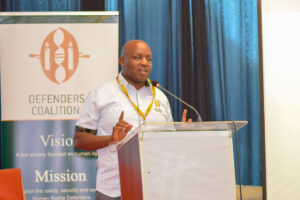
Beyond equipping HRDs with skills, the Academy also brings geographical and thematic human rights work diversity to exchange and share experiences.
Among others, the 2023 HRD Academy was attended by individuals working on climate justice, sexual minority, good governance, women and girls and indigenous people’s rights.
“We are proud that we have had a direct contribution to the establishment of movements and solidarity networks who strike powerful solidarity partnerships. We have also seen evidence that the diversity at the Academy helps reduce then feeling of “being alone in the struggle,” noted Gloria Madegwa, Head of Programs at the Defenders Coalition.
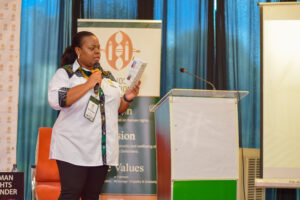
The theme for last year was on ecological justice and the need for HRDs to enhance their engagement with the topical global conversation.
“The need to have all these human rights champions together is aimed at emphasizing the fact we cannot seperate the issue of environmental protection from human rights,” noted Nyaguthii Chege, East Africa Hub Director, Natural Justice.
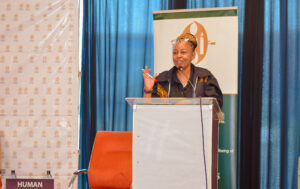
Defenders Coalition will continue to provide similar movement and solidarity building and skill enhancement platforms in 2024.
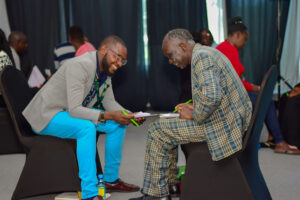
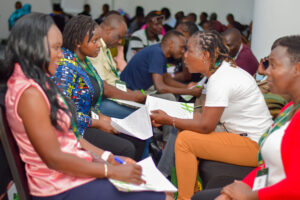
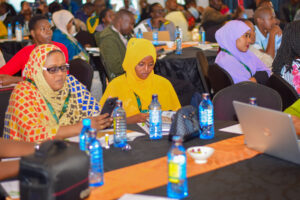
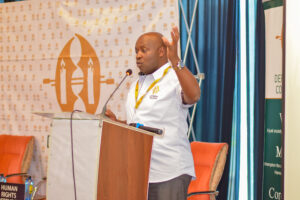
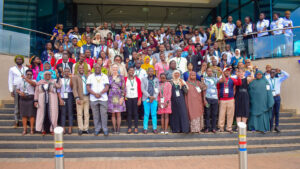
Defenders Coalition condemns the murder of Daniel “Sniper” Muthiani
Sunday, 31 December 2023 – Nairobi
The Defenders Coalition joins Kenyans in condemning the gruesome murder of political commentator and blogger Daniel “Sniper” Muthiani.
‘Sniper’s’ murder that sent shockwaves across the country paints the true picture of the situation of many advocates of good governance at the grassroot level: they are either harassed, surveilled, threatened, illegally arrested and detained, tortured and/or killed.
Trends point at a strong will by powerful political elites to silence all dissenting voices, whether by hook or crook, despite lawful guarantee of the freedom of speech and expression by Article 33 of the constitution of Kenya 2010.
As we condemn this barbaric killing of a young father who only wanted the best for Meru County, we call on the national government and the 47 county governments to create an enabling environment for human rights advocates, community bloggers, journalists, and social justice champions to freely express their views.
The work of these individuals and groups is pivotal in realising a dignified life for all Kenyans and thus need our support and not vilification. We call on these governments to create avenues for round table discussions and implementation of resolutions as opposed to creating criminal squads that harass, intimidate and squeeze air out of patriotic individuals.
We equally call on the Directorate of Criminal Investigations (DCI) and the Office of the Director of Public Prosecutions to independently and professional investigate and prosecute this crime that has not only robbed Meru County a progressive comrade but also ‘Sniper’s’ children of their right to fatherly love. The killers must be brought to book.
As we usher in the new year, let us remind ourselves once gains that NO ONE DESERVES TO LOSE THEIR LIVES FOR EXPRESSING DIVERGENT VIEWS IN ANY DISCOURSE.

A total of eighteen human rights advocates were recognized on Friday 8 December 2023 for their trailblazing work in the promotion and protection of human rights.
The awarding ceremony was held at the Royal Danish Embassy where various nominees were recognized under the Upcoming Human Rights Defender of the Year Award, Human Rights Defender of the Year Award, Munir Mazrui Lifetime Achievement Award and The Global Solidarity Award and the Popular Vote Award.
Despite not being among the list of nominees, five other rights defenders and organizations were recognized at the ceremony for their dedication and exemplary commitment in serving their communities.
Here is the full list of winners under each category:
Upcoming Human Rights Defender of the Year Award
In recognition of your exemplary and innovative use of Art and Theatre for the promotion and protection of human rights in Kenya’s informal settlements and beyond.
Human Rights Defender of the Year Award
In recognition of your exemplary and outstanding contribution towards the promotion and protection of human rights for LGBTIQ+ persons in Kenya
In recognition of your exemplary contribution towards the promotion and protection of human rights including minority groups within the Lake Turkana Basin.
Munir Mazrui Lifetime Achievement Award
In recognition of your courage and exemplary contribution towards good governance, constitutionalism, rule of law, and the promotion and protection of human rights and fundamental freedoms in Kenya
Global Solidarity Award
In recognition of your inspiration and solidarity with global struggles against human rights violations, racial discrimination and inequality across the globe.
Popular Vote Award
In recognition of your exemplary contribution towards the promotion and protection of human rights and the inclusion of persons with disability within the informal settlements in Nairobi County.
The Human Rights Defenders Awards Jury recognized five other rights defenders and organizations were recognized at the ceremony for their dedication and exemplary commitment in serving their communities. Here are their names:
1. Mukuru Community Justice Centre- for their advocacy initiatives on community land rights highlighting the impact of demolitions on families and the community within their informal settlement
2. Mark Ninga- For their uptake and utilization of social media platforms to advance sexual minority acceptance, inclusion and protection
3. Julius Kamau- For their exemplified and embodiments of article 37 on right to peaceful and unarmed protest despite facing numerous charges emanating from his arrest while peacefully protesting.
4. Alvin Macharia Kamau (Minor) – 9 year old from Nakuru who is the current Mr. Mini Environment For their initiatives towards rallying the young generation to take action on environmental rights and climate justice through tree planting.
5. Aileen Florence Akinyi (Minor)- 10 year old child philanthropist from Kisumu who is vocal on vulnerable girls and women especially widows, working with widows to raise funds for their economic empowerment and access to sanitary towels for vulnerable girls.
Read the profiles of all nominees here
